| The 2021 Dennis Wheatley 'virtual' Convention |
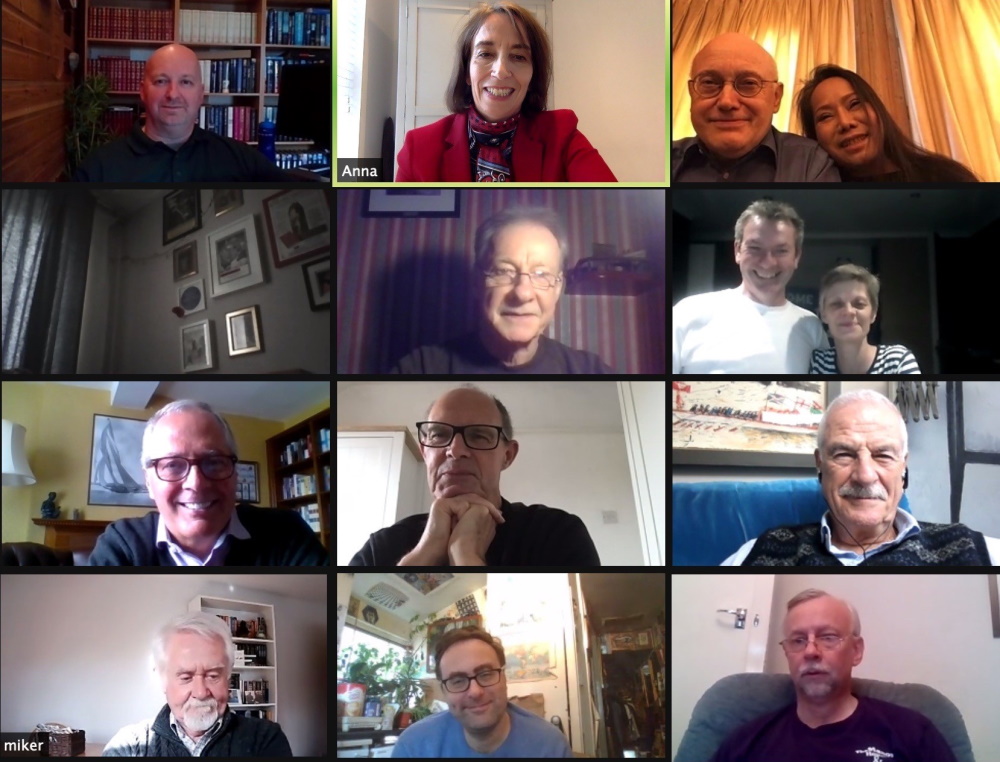
|
|
A screen-shot of the participants (one attendee/presenter not in the picture) |
The fourteenth Dennis Wheatley Convention took place on Saturday 16th October, and for the second time, and again because of Covid, it was held via 'Zoom'.
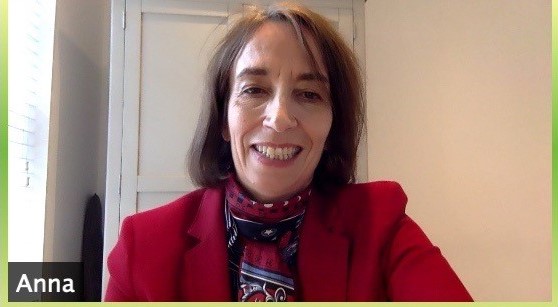
Anna Mannion performed the initial welcomes, and seamlessly managed the log-ins.
Everyone introduced themselves, and two newcomers, 'Raki' and Mike Ripley (of 'Kiss Kiss, Bang Bang: the boom in British thrillers from Casino Royale to The Eagle Has Landed' fame) were warmly welcomed and made themselves at home quickly.
The attendees expressed their thanks to Anna and Ken G for getting everything organised, and to Anna for also and once more managing the 'Zoom' aspect.
Comment was made during the session of the strange occurrence - once again - of the number 'thirteen'. Although overall more than fourteen people logged into the Convention, for the majority of the time the number logged in was thirteen. It's weird how we can't escape the number !
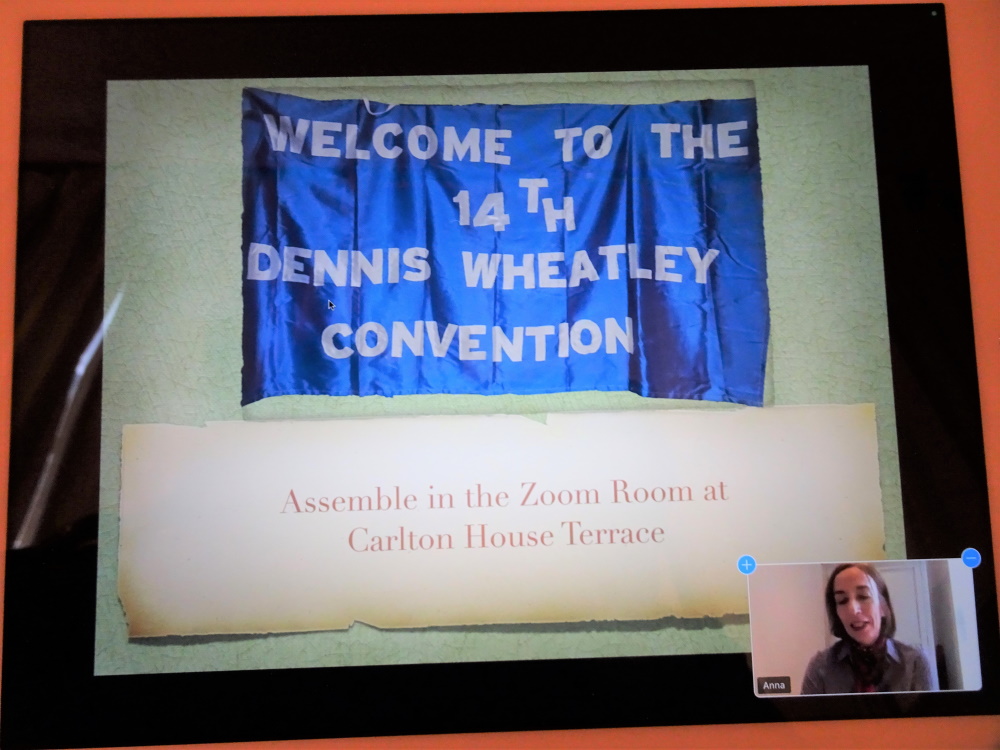
Ken G had once again had a 'Convention banner' created, and this was displayed at the launch of the proceedings.
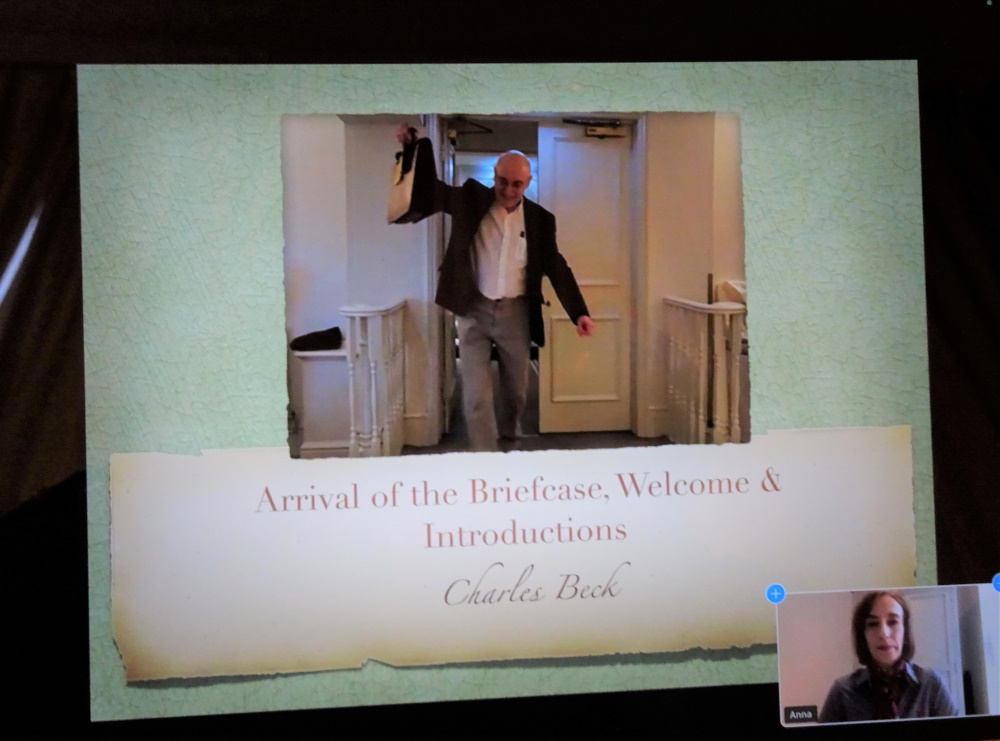
Again and in keeping with our Convention tradition, Charles brought in DW's briefcase, containing a copy of this year's Convention programme.
The Agenda
Click on the images to enlarge
Anna took the group through the Convention programme ...

As mentioned above, newcomers were warmly welcomed.
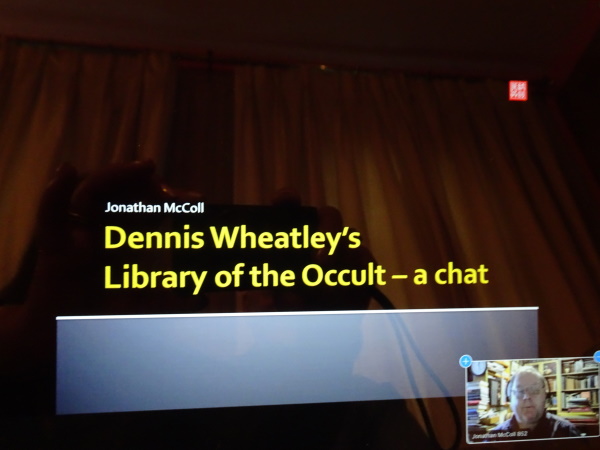
|
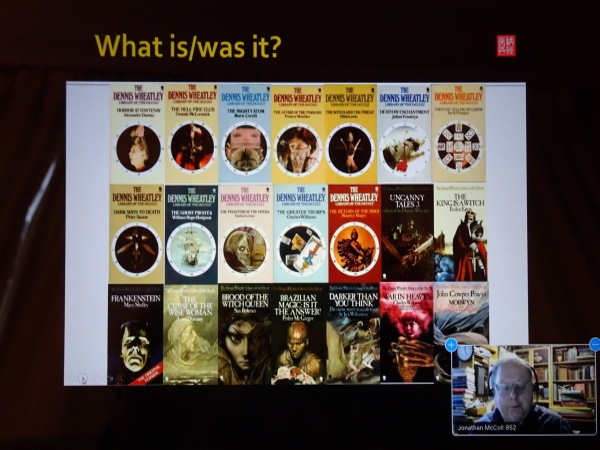
|
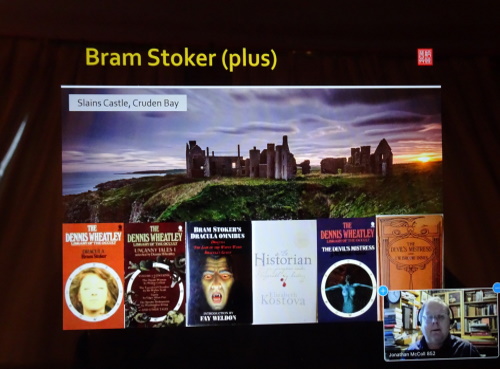
|
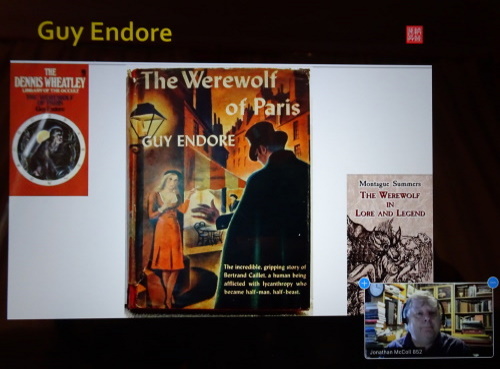
|
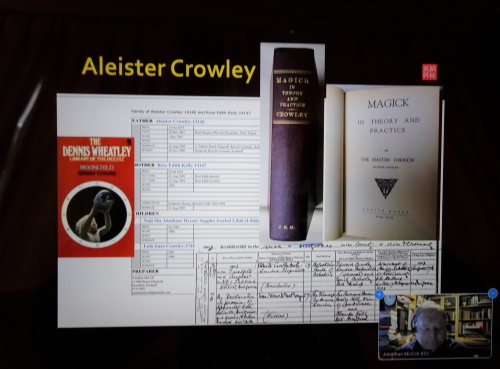
|
Jonathan McColl discussing DW's Library of the Occult
Jonathan McColl began the main part of the proceedings with a presentation on DW's 'Library of the Occult' - the series of books, some fact and some fiction, by other authors, which DW published in association with George Rainbird and Sphere Books in the mid-nineteen-seventies.
As well as being interesting in their own right, Jonathan explained that he found the series additionally interesting because in a sense each of the stories had been 'endorsed' by DW for an 'Occult reading list'.
Jonathan's broad-ranging talk covered the following volumes:
| Series No. 1 |
|
Bram Stoker's Dracula (1895) The Classic vampire novel, written in the form of a series of letters, and with numerous references to the north of England and Scotland. While prepping his talk, Jonathan suddenly realised that 'Dracula' must mean 'little dragon'. It is the most famous follow-on to the vampire novella The Vampyre (1819), which was written by John Polidori and based on a story told by Lord Byron in the famous competition between him and Percy and Mary Shelley which produced Frankenstein. Jonathan wasn't much taken by Polidori's novella, but was much taken by Elizabeth Kostova's modern vampire tale The Historian, and at least one in the audience agreed with him. |
| Series No. 11 |
|
J.W. Brodie-Innes's The Devil's Mistress (1915) Set in Scotland in Cromwell's time, and which DW considered a much better read than Dracula. |
| Series No. 2 |
|
Guy Endore's (aka Samuel Goldstein) The Werewolf of Paris (1934) In which an innocent is seduced by a priest with unexpected consequences. |
| Series No. 39 |
|
Mary Shelley's Frankenstein (1818) One of the towering giants in monster literature, and written for the competition with her husband-to-be and with Byron. In Jonathan's opinion, in many ways the monster can be regarded as the innocent hero. |
| Series No. 5 |
|
William Hope Hodgson's Carnacki stories (1913) A superb writer who gave DW the inspiration for his Sussamma Ritual, and much else. At least one in the audience agreed that 'The Whistling Room' was one of his classics. |
| Series No. 3 |
|
Aleister Crowley's Moonchild (1917) Another classic, and somewhat more readable than his 'factual' book Magick in Theory and Practice, to which he signed DW a famous copy. Given Crowley's reputation, it might surprise some that the hero is on the side of the Allies. |
| Series No. 4 |
|
Helena Blavatsky's Studies in Occultism (1895) The last book by the founder of Theosophy. Blavatsy's religious beliefs (along with Joan Grant's -see later) formed large parts of DW's own, and it would have been from her that he got the idea of 'The Lords of Light' guiding mankind from their secret base in Tibet. According to his Introduction, DW intended to republish more of her books in the fullness of time. |
| Series No. 44 |
|
Charles Williams' The War in Heaven (1930) A 'grail novel' which DW rated very highly. |
| Series No. 7 |
|
Paul Tabori's Harry Price - The Biography of a Ghost Hunter (1950) Harry Price was in many ways a precursor of James Randi (who died at the ripe old age of 92 shortly after the Convention); Harry Price used his own expertise in conjuring to help him to expose fraudulent the psychic effects of tricksters in the search for the 'real thing'. |
| Series No. 16 |
|
William Seabrook's short story The Witch's Vengeance. Seabrook is described in Wikipedia as an 'American occultist, explorer, traveller, cannibal, and journalist', and is perhaps best known for his knowledge of voodoo and his friendship with Aleister Crowley; His book The Magic Island (1929) about Voodoo in Haiti popularised zombies to Western audiences. |
| Series No. 15 |
|
Goethe's Faust (1790-1831) Largely in verse, this is regarded as one of Goethe's supreme achievements and followed Christopher Marlowe's play of 1592 in dramatizing the character, and has since been followed by other well-known renditions both in print and in the cinema. |
| Series No. 10 |
|
A.E.W. Mason's The Prisoner in the Opal (1928) A detective story with a satanic cult as the backdrop, and featuring Inspector Hanaud, a probable inspiration for Agatha Christie's Hercule Poirot. |
| Series No. 17 |
|
John Buchan's The Gap in the Curtain (1932) In which attendees at a country house are given the opportunity to see a newspaper for a year hence with interesting results. DW wrote in his introduction that it would be difficult to find in any other book a final chapter that equalled it in suspense. |
| Series No. 22 |
|
Joan Grant's Winged Pharaoh (1937) The first of her 'Far Memory' books in which she told the story of what she believed to be her former lives; a book which caused a sensation and which (along with his friendship for her) strongly influenced DW's religious beliefs. For more about Joan Grant's association and friendship with Dennis Wheatley, see the special exhibition on the subject in the site's virtual museum. Raki reminded us that Joan Grant had chosen the name of 'Raki' for one of the two principal characters in her later Far Memory book Scarlet Feather. |
| Series No. 34 |
|
Gaston le Roux's The Phantom of the Opera (1911) Which DW regards as one of the most famous tales of the occult by a French author. |
| Series No. 27 |
|
Marie Corelli's (aka Marie Mackay) The Mighty Atom (1896) The story of a young boy grappling with the problem of whether he has a soul. DW regarded it as still good, although he commented that it positively dripped with sentiment. |
In the discussions that followed, Darren observed how, for whatever reason, some of the books announced in the initial promotional manuscript (click here to view) such as M.R. James' Ghost Stories of an Antiquary never in fact got published. The reasons were obscure.
Mark commented on how various people like Phil Baker had said that some volumes were much harder to obtain that others. No one could readily identity which volumes these were, or why, but Jonathan hazarded a guess that it might be some of the later ones. It was noted that neither Bob Rothwell nor Charles had ever seen a copy of the White Lion editions of Dracula, Moonchild or The Werewolf of Paris, which had been the first three books in the 'Sphere' series.
Jonathan found the omission of Gustav Meyrink's The Golem (1917-14) curious.

There then followed a tea and coffee break.
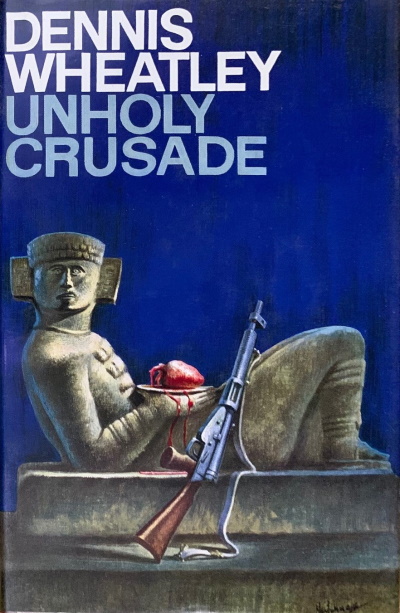
|
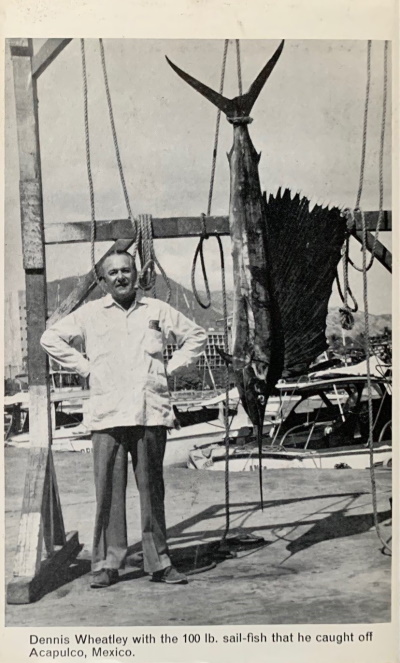
|
Group book review: Unholy Crusade
The book had been chosen by a Committee chosen at last year's Convention, and although all found it interesting and to a degree enjoyable, there was a general consensus that is was not one of DW's best - at least to our modern audience.
Darren commented that he was glad the Committee had chosen it, because it finished off his reading of DW's Black Magic series. He liked the title.
Ken G made several observations; he found the book fragmentary, and wondered where it was going, but like several others he found the pace accelerated significantly in the last hundred pages or so.
Anna, Ken G and many others found the early parts of the book were a bit too much like a travelogue, recalling the critics' comments about The Fabulous Valley, where they said that DW couldn't make up his mind if he was writing a thriller or a travel book.
Ken G commented on the odd section where Gordon left his hotel for a few days' excursion, and returned to find that his room had been booked out to someone else in his absence. He wondered if that had happened to DW.
Chela was a suitably strong female character, but 'Lucky' Gordon's character was not really developed, and several found it hard to identify with him.
Jonathan commented that if someone had lanky hair or a sallow complexion they were likely to be a 'baddie', and if they had 'dead looking eyes', this turned into a certainty; whereas if they were a strapping youth of 6"3' with good looks they were highly likely to be a 'goodie'.
Ken G commented that in the days of plain food in the U.K. and before aeroplane travel, the descriptions of exotic food and exotic places would probably have appealed to people.
The Scottish contingent noted with satisfaction that Gordon was Scottish.
Charles said he would have liked it more had it had had a different ending (no spoilers !) and both Raki and Charles picked up on the somewhat dismissive references to the by then dead bestseller Ian Fleming - DW putting Fleming after himself in a list of high-earning writers, and then getting a British Wing Commander working for the secret services to talk about '... all those silly, amusing gadgets that one reads about in the Bond books' (and which incidentally appear in the Bond films but not in the novels, possibly suggesting that DW had not read them -?).
They wondered if - with Fleming's success with the Bond films - DW was perhaps jealous. And perhaps slightly miffed, per Jeremy Duns article that James Bond was perhaps in part taken from Gregory Sallust, although Raki subscribed to the view that all authors unconsciously absorbed what had gone before them, and that what they wrote should not always be seen as deliberate plagiarism.
Duncan agreed with the jealousy angle. Several found the book more-than-usually violent, and the end of the principal 'baddie' quite grisly. If DW didn't give a graphic description of the villain's demise, it was perhaps because he didn't need to.
Bill had thought it a really good story and was going to consult a Mexican friend on what he thought of it.
Charles thought that (as per Linda Lee) some of the sex scenes were a bit clumsy and others found some parts of these thoroughly unconvincing.
Jonathan wondered if the person who acquired the mansion was based on Lew Grade, and if perhaps Winifred had some basis in Nancy. Someone also wondered if 'Lucky' Gordon had had a hand in arranging Winifred's 'lucky' accident.
All in all, while it may not have been one of DW's best, everyone seemed to have enjoyed reading it.

Before lunch Anna took some screen shots, to take the place of the usual group photo ...

A self-catering lunch followed ...
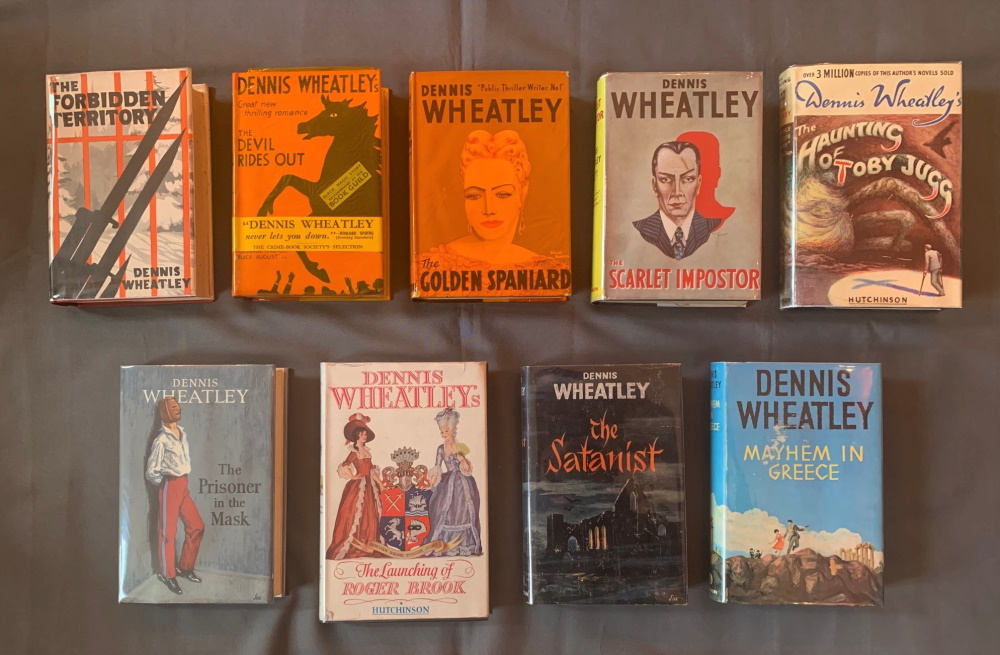
| Mark: | A Wordsworth The Devil Rides Out. Bought at a remainder bookshop outside Victoria Station. |
| Anna: | The Scarlet Impostor. Age 14 and taken off her father's bookshelf. |
| Charles: | The Prisoner in the Mask. Similar age. No excuse. |
| Ken G: | The Haunting of Toby Jugg. Age 12-14. Ken's brother's book, and it had terrified him. This led Ken G to have a read. |
| Darren: | His brother had read an omnibus, and while he did not enjoy The Devil Rides Out, he was gripped by The Haunting of Toby Jugg. Darren read the latter and was hooked. |
| Bill: | Introduced through his sister. He was not sure which book he read first. Possibly The Satanist. |
| Mike: | Mike's Zoom connection was bad, but he confounded us all by talking favourably about Mayhem in Greece. This is a thread which must be continued! |
| Raki: | The Launching of Roger Brook, followed by The Forbidden Territory. |
| Duncan: | The Satanist. In his early twenties. |
| Mary: | The Devil Rides Out. The cover whetted her appetite. |
| Keith: | The Golden Spaniard. Then a Gregory Sallust, and then all he could find. |
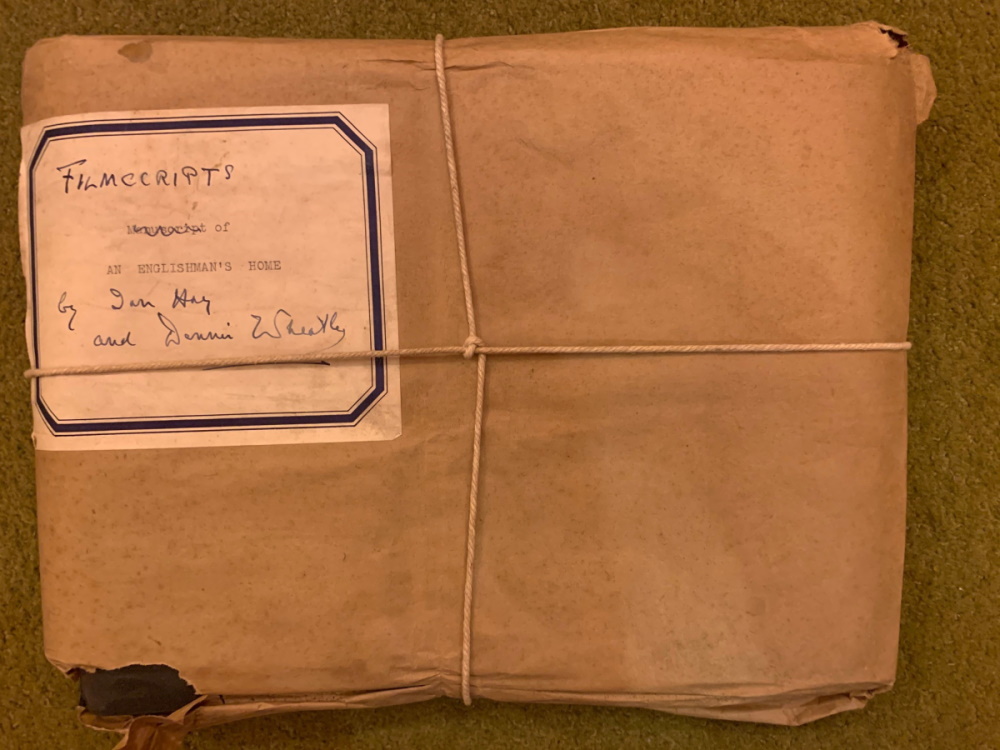
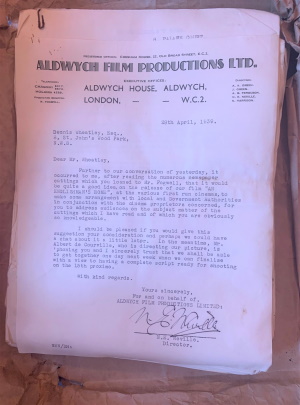
|
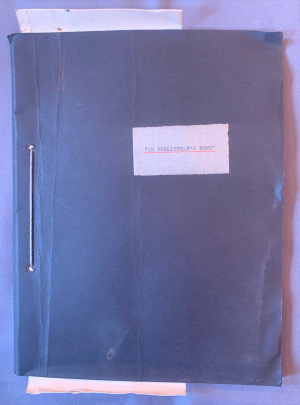
|
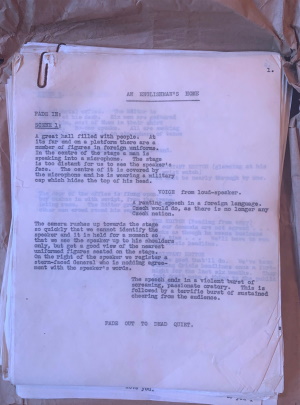
|
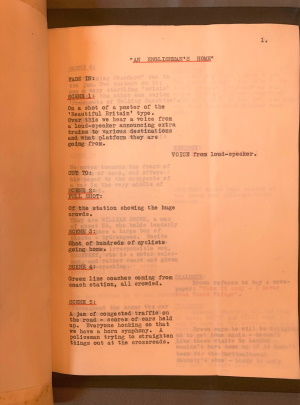
|
Before the 'grand reveal', Charles asked Darren to give an Introduction.
The package which was going to be opened was DW's copy of the typescript of a film script which he wrote with Ian Hay (aka Major General John Hay Beith, described in Wikipedia as a schoolmaster and soldier, novelist, playwright and essayist) in 1939.
Having its origins in a play called The Patriot by Guy du Maurier which caused a sensation in 1909, and which was made into a silent film in 1914, Darren regarded it as a unique film for its time in that it addressed the invasion of Great Britain - up to that point there had been no GB invasion films, so it was made as a bit of a wake-up call to its audience - as indeed was the original play.
Darren liked to think that in writing the screenplay it got Dennis Wheatley's brain ready for his War Papers, which led to his subsequent work in the Cabinet War Rooms; so in that way this film could be regarded as an important step in the making of Dennis Wheatley.
The film was released in the U.S. as Mad Men of Europe, and in South America as Invasion.
The musical director of the film was Louis Levy, who also composed the music for the film of The Forbidden Territory.
How much of this film script made it through to the final film version is as yet unclear, as four writers are mentioned in a contemporary review and as DW was not among them; but the copy being looked at seems without doubt to be the work of just Ian Hay and DW.
As far as Darren was aware, there are no known copies of the entire film, although there is a 20 minute reel at the BFI, which he intends to go and view at some point to see how closely it corresponds to what is being revealed.
Charles carefully undid the knot (next time he will take Darren's advice and preserve the knot but cut the string ...) and carefully unwrapped the brown paper to reveal Dennis Wheatley's original correspondence with N.E. Neville, the Director of Aldwych Film Productions, and the film script in various different versions.
Charles read out a few pages from the shortest of them, and they sounded suitably exciting.
There was general agreement that if Charles could produce a transcript, it would be fun to do a reading of the play as a set-piece at the next Convention if time permitted.
A transcript is therefore being worked on ...

A tea and coffee break then followed.
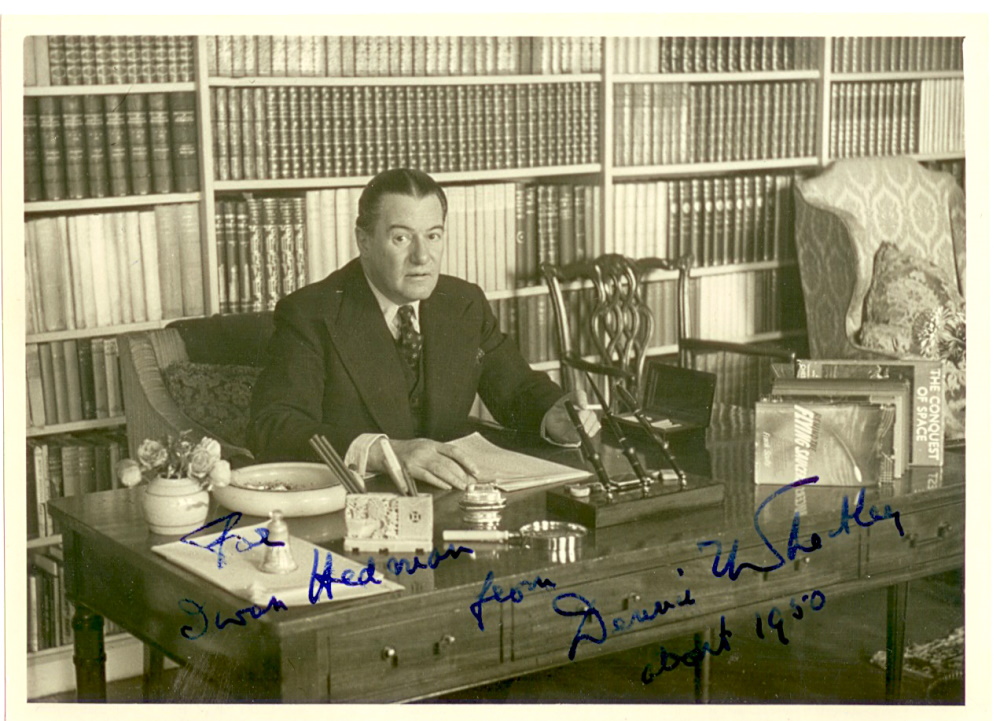
The next session explored the audience that DW writing for.
The first observation that was made was that while the publishers released some occasional global statistics, and while some of the books are marked 'Nth Thousand', and while DW himself kept detailed records of how many copies were sold of each title, in the days before the internet and 'cookies', it would have been impossible to know the demographic or gender breakdown of the readers of DW's novels. That said, Charles observed that much of DW's fan mail that he had seen seemed to come from women, while most of the inscribed copies that came on the market seemed to have been inscribed to men. The general feeling was that this might have been because it was not 'the done thing' for women in those days to stand in queues for autographs.
Several commented on the presence of 'strong women' in the books. Not just Chela, who figured largely in the Convention's chosen book to review Unholy Crusade, but Marie Lou in the Duke de Richleau series, Erica in the Gregory Sallust series, and Georgina in the Roger Brook series.
Someone made the profound comment that in a sense authors always 'write for themselves'.
That said, there was plenty of evidence that DW thought carefully about what his audience wanted when selecting his topics. He deliberately chose to write The Scarlet Impostor at the start of World War Two to make it topical, and at the end of Faked Passports, he went so far as to invite readers to write to him and let him know what they would like as the theme of his next novel - another Gregory Sallust story, a story of strange happenings in the West Indies (i.e. Strange Conflict), or a new departure - a Historical Romance; showing that he was already thinking of creating Roger Brook. In the end his readership said they wanted a third Gregory Sallust novel in a row, and The Black Baroness resulted.
In the same way, DW ceased to use the 'sat down at eight o'clock' beginning for his De Richleau novels after Strange Conflict because it might lead his readers to think (wrongly) that they had already read the novel, and he ceased to write Julian Day novels after they failed to please his readership (clearly some of those, like one of our reviewers who read Unholy Crusade preferred 'happy endings').
Ken G commented on the importance of foreign travel and exotic food to audiences who had not been accustomed to them (things which, as Raki observed, Ian Fleming also built on), and there was also a definite theme not just of education (the 'info dumps') but of letting the readership have a peek at how (DW thought) the nobility talked at dinner parties.
While escapism was definitely to the fore, as DW observed to Anthony Lejeune in a letter which is on display in the virtual Museum, he was also writing to try to inspire young people to espouse the standards that he himself believed in - 'in this present age it seems more than ever necessary to endeavour to install such sentiments into young people by the example of fiction heroes'.
And as per Unholy Crusade, as the times changed and mentions of sex became more permissible (and perhaps even obligatory), DW was certainly not averse to joining the bandwagon ... and possibly, given his own hedonistic past, with a certain amount of enjoyment ...
All in all it was a complex theme, and proved a thoroughly fertile topic for discussion.
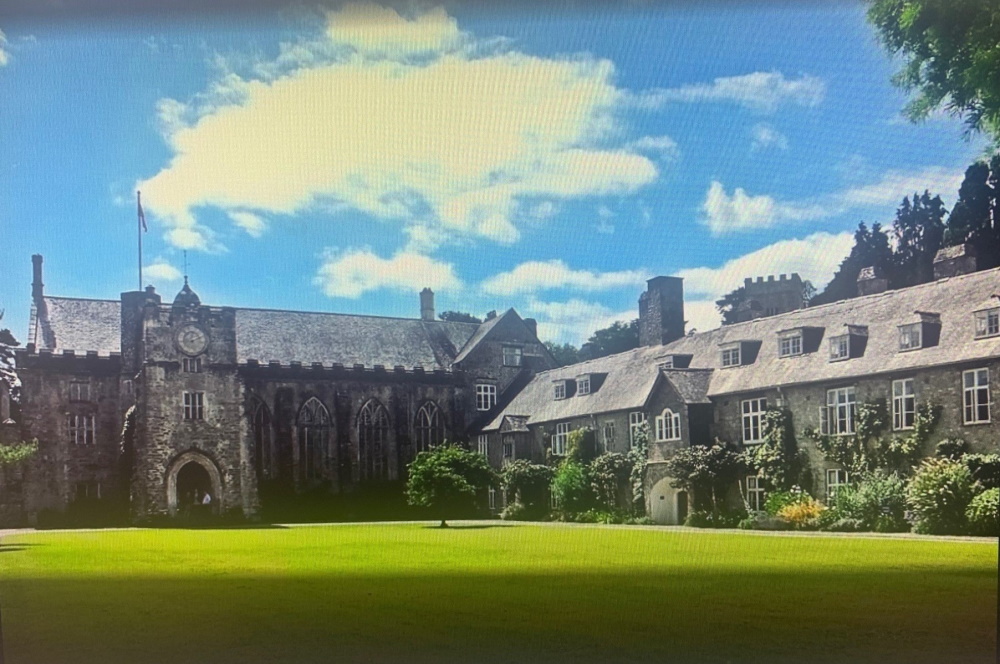
It is hoped that the next Convention can be 'physical', and but for those who cannot manage to travel, 'Zoom' participation will be offered if possible.
The intention is to go to Dartington Hall in Devon (the school that served as the inspiration for Weylands School in The Haunting of Toby Jugg), with the dates being 14th-16th October 2022.
Given the association, participants may wish to read / re-read The Haunting of Toby Jugg in advance.
If it makes it easier for travelling, Anna and the other organisers are happy to act as a clearing house if anyone is happy to give lifts or wants to do some carpooling.
By common acclaim Darren was asked if he would do a 'Dartington Hall' update.
It was agreed we should do another book review, and Mediterranean Nights, Mayhem in Greece (largely due to Mike's comments !) and V for Vengeance were raised as potential candidates. Anna volunteered to poll those intending to go to the Convention for their preferences in due course.
Anyone else who would like to present or to suggest a topic is warmly invited to get in touch with Anna, Ken G or Charles in the first instance. As always, participation is incredibly welcome.
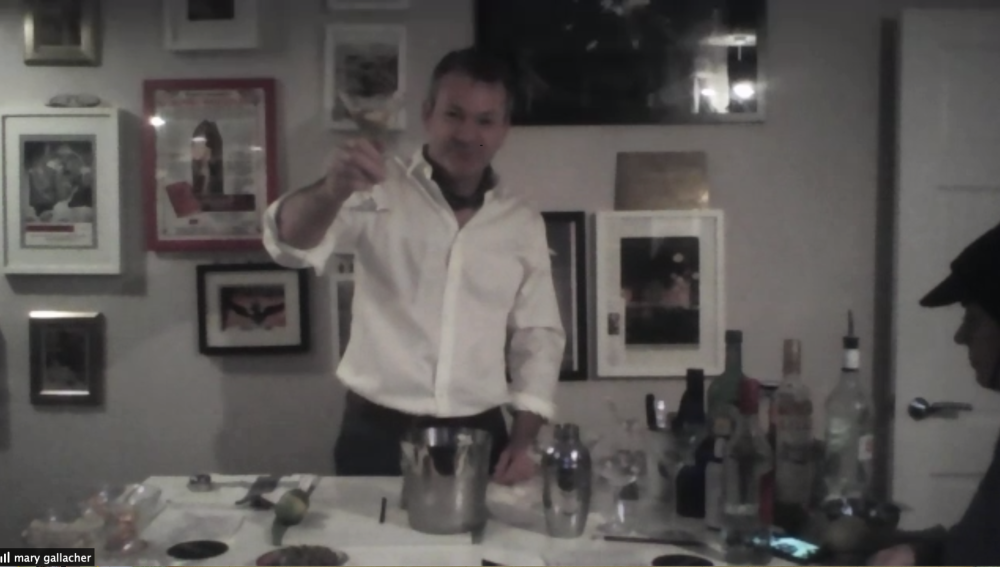
While it had to be virtual, a number joined up for 'post-Convention' drinks, and a good time was had by all, as they say.
While we did not have any formal toasts, those who could not attend this time were by no means forgotten, and we hope to see many in person next year.
Charles B.
Nov 2021
This page last updated Copyright © 2002-2006 Bob Rothwell. 2007-2026 Charles Beck.